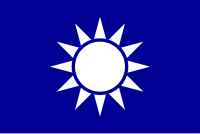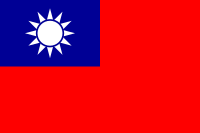This article includes a list of references, related reading, or external links, but its sources remain unclear because it lacks inline citations. (April 2022) |
Dang Guo (Chinese: 黨國; pinyin: Dǎngguó; lit. 'party-state'), also known as Tang Kuo, was the one-party system adopted by the Republic of China (ROC) under the Kuomintang, lasting from 1924 to 1987. It was adopted after Sun Yat-sen acknowledged the efficacy of the nascent Soviet Union's political system, including its system of dictatorship. Chiang Kai-shek later used the Kuomintang to control and operate the Nationalist government and the National Revolutionary Army. All major national policies of the government bureaucracy were formulated by the Kuomintang, giving the party supreme power over the whole nation.
Following the beliefs of Sun Yat-sen, political power should have been returned to the people after the National Revolutionary Army militarily ended the Warlord Era. However, martial law in Taiwan continued from 1949 until 1987, during which other political parties were banned. Martial law was lifted in 1987 by president Chiang Ching-kuo, a move that legalized other political parties such as the Democratic Progressive Party and ended the Dang Guo era.

